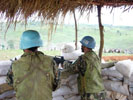
A disturbing revelation about the recent mass rapes in eastern Congo emerged from the pages of The New York Times yesterday: the U.N. peacekeeping mission in Congo knew the violence was unfolding from the very first day. According to figures updated today by the United Nations, at least 240 women, children, and some men were raped during the four-day long spate in late July and early August.
The Times’ Josh Kron and Jeffrey Gettleman got their hands on an internal U.N. email from July 30 – the day the raping spree broke out – that mentioned that the ruthless rebel group known as the FDLR had overtaken the town of Mpofi. The email, sent by the U.N.’s humanitarian coordination organization, noted that one woman had been raped. It advised aid groups to avoid the area.
Contrary to what the email and a U.N. humanitarian bulletin reveal, officials with the peacekeeping mission initially said that they were unaware that rebels were raping women in Mpofi until August 12 when the International Medical Corps alerted them. When presented with the evidence of the July 30 email and the August 10 bulletin, U.N. officials suggested that initial reports about FDLR movement and rapes were commonplace enough to not initially raise concerns about a large-scale operation. “At the time, there was one alleged rape and no reason to believe that this was happening on a mass-scale as later reported,” said Roger Meece, a U.N. special representative, in reference to the email.
As the NYTimes pointed out, the Mpofi tragedy is just the latest in a string of instances in which mass violence broke out with peacekeepers nearby, and alarmingly, it seems that the U.N.’s default response is to plead ignorance.
Enough’s eastern Congo based researcher Fidel Bafilemba noted that in addition to the one rape case that the U.N. knew about, a series of FDLR/Mayi-Mayi attacks on villages nearby Mpofi, including the kidnapping of two Indian co-pilots and nine Congolese, were unmistakable signs that should have prompted peacekeeping troops to be more alert. Civil society activists in Goma have a pessimistic view about the potential for MONUSCU to improve its response when civilians are in danger. A number of local leaders interviewed told Enough that the U.N. peacekeeping mission may stay in Congo for a century and reformulate its mandate as many times as necessary, but indifference and inaction towards Congolese citizens will not change.
So is the U.N. peacekeeping mission simply in over its head, even after 11 years of being deployed in eastern Congo? One longtime U.N. official who recently served in eastern Congo, seemed to think so: “There is a kind of general state of incompetence, which is linked to apathy,” said Karl Steinacker. “If you realize you can’t deal with the situation, you may just decide to do nothing.”
The U.N.’s new special representative on sexual violence in conflict, Margot Wallström, said on Tuesday that the U.N. is investigating its response in an effort to improve implementation of a joint government-U.N. strategy for addressing sexual violence. In particular, U.N. peacekeepers must be trained to better respond to reports of sexual violence since they are often best placed to be first responders, Wallström said. However, she noted that the U.N. faces the challenge of being pressured to drawdown its presence in Congo, while also being expected to mount faster and more effective responses. “So we are expected to do more at the same time with less peacekeepers,” Wallström said. She noted that at the time of the recent North Kivu attacks, 80 blue helmets were stationed in an area over 300 square kilometers.
Meanwhile, a number of teams from the U.N. and aid organizations have been dispatched to Mpofi and the surrounding area to assess the needs of survivors.

